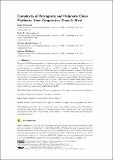Complexity of retrograde and helpmate chess problems: Even cooperative chess is hard
Author(s)
Brunner, J; Demaine, ED; Hendrickson, D; Wellman, J
DownloadPublished version (743.9Kb)
Publisher with Creative Commons License
Publisher with Creative Commons License
Creative Commons Attribution
Terms of use
Metadata
Show full item recordAbstract
We prove PSPACE-completeness of two classic types of Chess problems when generalized to n × n boards. A “retrograde” problem asks whether it is possible for a position to be reached from a natural starting position, i.e., whether the position is “valid” or “legal” or “reachable”. Most real-world retrograde Chess problems ask for the last few moves of such a sequence; we analyze the decision question which gets at the existence of an exponentially long move sequence. A “helpmate” problem asks whether it is possible for a player to become checkmated by any sequence of moves from a given position. A helpmate problem is essentially a cooperative form of Chess, where both players work together to cause a particular player to win; it also arises in regular Chess games, where a player who runs out of time (flags) loses only if they could ever possibly be checkmated from the current position (i.e., the helpmate problem has a solution). Our PSPACE-hardness reductions are from a variant of a puzzle game called Subway Shuffle.
Date issued
2020-12-01Department
Massachusetts Institute of Technology. Computer Science and Artificial Intelligence LaboratoryJournal
Leibniz International Proceedings in Informatics, LIPIcs
Citation
Brunner, J, Demaine, ED, Hendrickson, D and Wellman, J. 2020. "Complexity of retrograde and helpmate chess problems: Even cooperative chess is hard." Leibniz International Proceedings in Informatics, LIPIcs, 181.
Version: Final published version